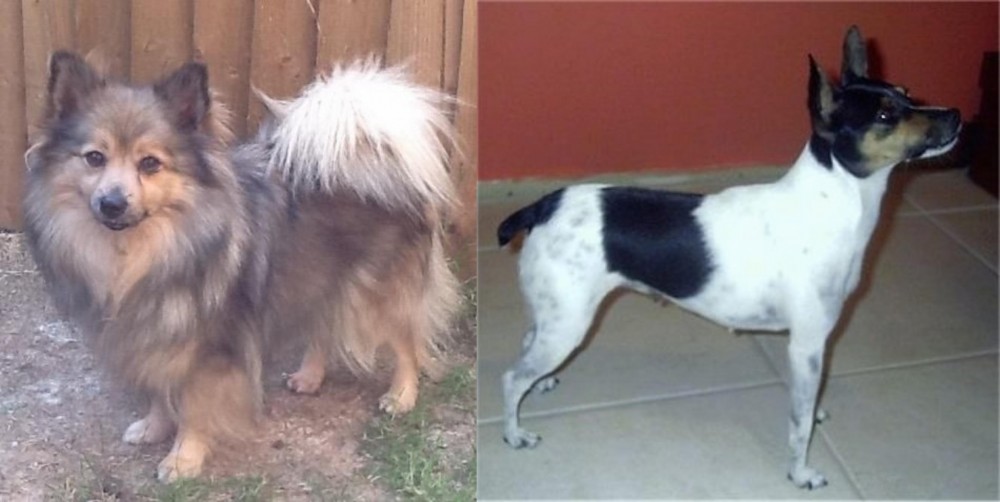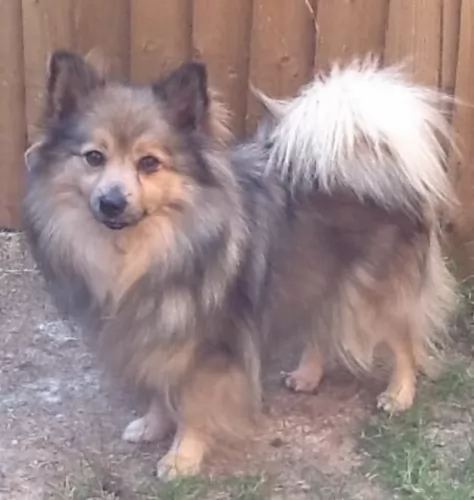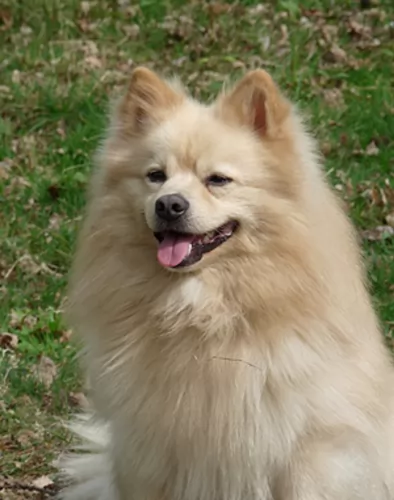 Petzlover
Petzlover German Spitz (Mittel) is originated from Germany but Miniature Fox Terrier is originated from Australia. German Spitz (Mittel) may grow 8 cm / 4 inches higher than Miniature Fox Terrier. Both German Spitz (Mittel) and Miniature Fox Terrier are having almost same weight. Both German Spitz (Mittel) and Miniature Fox Terrier has almost same life span. Both German Spitz (Mittel) and Miniature Fox Terrier has almost same litter size. German Spitz (Mittel) requires Moderate Maintenance. But Miniature Fox Terrier requires Low Maintenance
German Spitz (Mittel) is originated from Germany but Miniature Fox Terrier is originated from Australia. German Spitz (Mittel) may grow 8 cm / 4 inches higher than Miniature Fox Terrier. Both German Spitz (Mittel) and Miniature Fox Terrier are having almost same weight. Both German Spitz (Mittel) and Miniature Fox Terrier has almost same life span. Both German Spitz (Mittel) and Miniature Fox Terrier has almost same litter size. German Spitz (Mittel) requires Moderate Maintenance. But Miniature Fox Terrier requires Low Maintenance
 Originating in Germany, the German Spitz Mittel is an alert, vigilant dog and it is these qualities that made him sought after for working on farms.
Originating in Germany, the German Spitz Mittel is an alert, vigilant dog and it is these qualities that made him sought after for working on farms.
He is no new breed and is the 3rd largest of the five German Spitz varieties. It is believed that the German Spitz descended from the Northern sled and herding dogs which arrived with the Vikings into Europe. When you do research you see that the dogs are mentioned in German literature which dates way back to to 1450 already.
 Known as Mini Foxies or Toy Fox Terriers, these dogs hail from Australia, having been bred there since the 1800s already.
Known as Mini Foxies or Toy Fox Terriers, these dogs hail from Australia, having been bred there since the 1800s already.
They are descendants of fox terrier types which were bred in England and then brought to Australia by early settlers.
It is believed the small Smooth Fox Terriers were crossed with Manchester Terriers and then the puppies further bred and crossed with other small breeds. The idea was to have a small, light, quick dog. The Miniature Fox Terrier is exactly like this, developed as a hunting dog.
 The German Spitz Mittel is similar in looks to the other sizes of German Spitz. The Mittel is a medium sized dog and stands between 30 and 38cm in height and weighs between 7 and 11kg. You’ll find him in solid colors such as tan, liver, white, fawn, black or a mix of these colors.
The German Spitz Mittel is similar in looks to the other sizes of German Spitz. The Mittel is a medium sized dog and stands between 30 and 38cm in height and weighs between 7 and 11kg. You’ll find him in solid colors such as tan, liver, white, fawn, black or a mix of these colors.
He has a soft woolly undercoat and a long outercoat with a mane-like ruff at the neck. He has a fairly long muzzle, dark eyes, sharp erect ears and a bushy tail which curls over his back.
Affectionate, faithful, and always happy by nature, the German Spitz Mittel is a family companion that wants to be part of everything his human family is up to. He makes a good watchdog. He is alert and has a distrust of strangers.
He gets on well with children in the home and he can also live in peace with other dogs. Because he is an intelligent dog, you won’t have much trouble with training- and socializing him, although he will require a firm, consistent owner and trainer.
Training and socialization are important as there are always some important commands such as sit, stay, come and lie down that you will want him to respond to immediately.
 With longevity on his side, the Miniature Fox Terrier can live to be between 10 and 14 years of age or live to be even older - up to 18 years of age.
With longevity on his side, the Miniature Fox Terrier can live to be between 10 and 14 years of age or live to be even older - up to 18 years of age.
He stands at between 24 – 30cm and weighs anything between 3 and 6kg. His coat is short but he sheds quite a bit so regular brushing will become necessary.
The coat is smooth and is mostly white and tan or white and black but it can be tri-colored too – white, black and tan.
The ears are semi-erect, semi floppy and he has a bright, expectant look about him. The tail has always been traditionally docked, giving him a distinctive look, but now it tends to be undocked.
Your Miniature Fox Terrier is a bold little dog, and is protective and loyal towards his human family. He is lively and courageous and has lots of energy so he will be wanting lots of games indoors and out. He will love to go on a walk every day.
They make great family pets, getting on well with children and other pets in the home. They’re adaptable and can do well in the city or the countryside.
 People who have owned a German Spitz Mittel are delighted with him, saying that he is such an easy-going, happy dog. He is social and thrives on the interaction he has with his human family.
People who have owned a German Spitz Mittel are delighted with him, saying that he is such an easy-going, happy dog. He is social and thrives on the interaction he has with his human family.
He won’t do well if you simply put him in your backyard and forget about him, using him merely as a watchdog.
The German Spitz Mittel dog is one dog that definitely lives up to the title of man’s best friend. He is social, happy, loving, loyal, playful, entertaining and smart too, and when you treat him the way he deserves, you’ve got the most awesome friend.
 Miniature Fox Terriers aren’t going to disappoint you one bit in terms of making an excellent pet.They make great family pets. They are loyal companions and they also make great watchdogs, being able to adapt to life in the city as well as the countryside.
Miniature Fox Terriers aren’t going to disappoint you one bit in terms of making an excellent pet.They make great family pets. They are loyal companions and they also make great watchdogs, being able to adapt to life in the city as well as the countryside.
They can yap quite loudly so you need to be careful of this if you live in a small property in the city.
This is such a jaunty little dog, full of fun and high spirits. You won’t know a dull moment with such a friendly, entertaining little pet. In exchange for all he offers you in terms of friendship, he also wants your love and attention.
Provide him with good food, a good deal of exercise, a dry, warm place to sleep and your ongoing attention and he is going to shower you with his love and loyalty.
 German Spitz dogs are healthy, and when you shower him with love and attention and good food, you can expect to have him around for up to 15 years of age.
German Spitz dogs are healthy, and when you shower him with love and attention and good food, you can expect to have him around for up to 15 years of age.
Of course, as with any other healthy dog breeds, there are always one or two common dog illnesses that your dog may get. These include hip dysplasia and eye diseases. If you notice symptoms that indicate possible joint issues with your pet, get him to the vet immediately.
Patellar Luxation for instance occurs when your dog’s kneecap is dislocated. It is more common in toy breeds like the German Spitz. It can be painful for your pet and lead to lameness. If your dog has problems with his hip, it can actually force the patella out of its groove, which is a secondary condition.
 Your Miniature Fox Terrier can live to be between 10 and 14 years of age when looked after well, but there are one or two common dog illness that can plague any dog, and Paella Luxation is one.
Your Miniature Fox Terrier can live to be between 10 and 14 years of age when looked after well, but there are one or two common dog illness that can plague any dog, and Paella Luxation is one.
Patella luxation is fairly common with small dogs, occuring when the dog’s kneecap becomes dislocated from its thigh bone.Your dog will skip and hop along. Treatment for patella luxation can range from non-invasive treatments such as massage to surgery.
Dental health is important too, and seriously bad breath can be indicative of dental decay. Dental plaque can cause bad breath and lead to other health problems that aren’t directly related to teeth. The heart and kidneys can be put at risk. There are dental products such as canine toothbrush and toothpaste which can be used to clean your dog’s teeth. Don’t ever use human toothpaste as this can be toxic for your pet.
 You can help reduce loose hairs with your German Spitz by brushing his thick coat twice a week. It’s a good time to also inspect your dog for ticks and fleas.
You can help reduce loose hairs with your German Spitz by brushing his thick coat twice a week. It’s a good time to also inspect your dog for ticks and fleas.
Your German Spitz Mittel isn’t the most active dog, but he will still need regular exercise. Going on a walk is good for both you and him. He is a mentally sharp dog too and these walks keep him both physically- and mentally fit. He also loves ball games.
Every dog deserves the best food, and if you feed your German Spitz Mittel with a commercially manufactured dog food, make sure its one of the top quality ones. You want to avoid foods packed with preservatives, colorants and fillers. You want dog foods with minerals and vitamins with high protein and ingredients such as Omega 3 and 6 to promote health skin.
There are also some dog foods which have ingredients in them such as polyphosphates. Ingredients like this keep your dog’s teeth clean.
Try and also give him some cooked rice, vegetables and chicken mixed into his kibble from time to time as well as raw meat. He should never be without fresh, cool water.
 Feed your terrier a quality commercially manufactured dog food twice a day. They are small dogs, but highly energetic so choose dog foods which are geared towards small, energetic dogs.
Feed your terrier a quality commercially manufactured dog food twice a day. They are small dogs, but highly energetic so choose dog foods which are geared towards small, energetic dogs.
His age and his activity levels will also give you an idea as to what to feed him. Apart from dry kibble, give him simple, tasty, nutritious home-made food too.Every now and again, add in boiled chicken, brown rice or pasta and some cooked vegetables such as potato, carrots and spinach. A little bit of raw meat occasionally can also do wonders.
Keep meals plain and simple like this to avoid stomach upsets.
Ensure your pet has constant access to fresh, cool water.
Brush him twice a week to keep the coat free of loose hair. Try and avoid bathing your pet as it causes dry skin and itchiness. Rather wipe him down with a rubber grooming mitt to keep him groomed.
Check his eyes and ears for infection. Check for fleas and ticks and any unusual lumps. Trim his nails too.
Take him to the vet when he appears to be ill and keep his vaccines up to date.